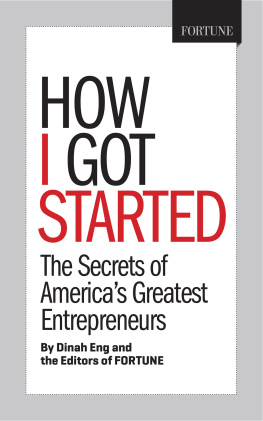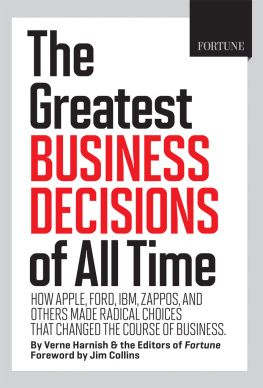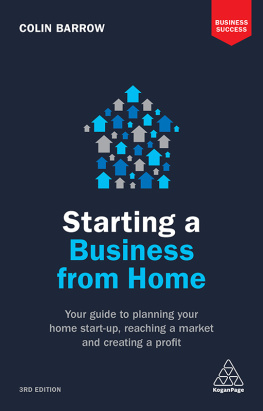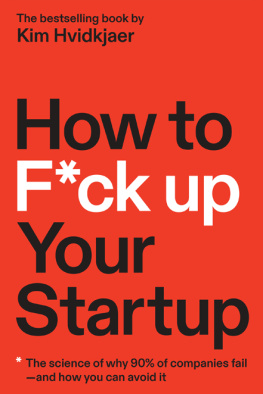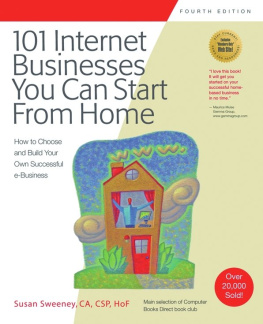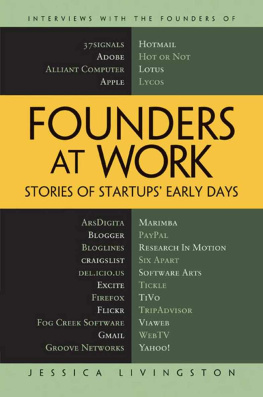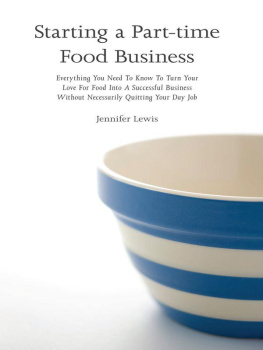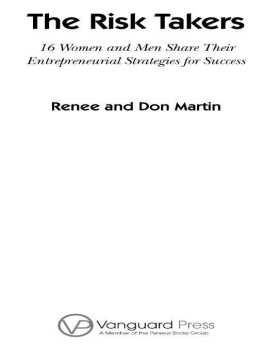Copyright 2014 Time Home Entertainment Inc.
Published by Fortune Books, an imprint of Time Home Entertainment Inc.
1271 Avenue of the Americas
New York, NY 10020
All rights reserved. No part of this book may be reproduced in any form or by any electronic or mechanical means, including information storage and retrieval systems, without permission in writing from the publisher, except by a reviewer, who may quote brief passages in a review.
ISBN 10: 1-61893-980-7
ISBN 13: 978-1-61893-980-7
Fortune is a registered trademark of Time Inc.
We welcome your comments and suggestions about Fortune Books. Please write to us at:
Fortune Books
Attention: Book Editors
P.O. Box 11016
Des Moines, IA 50336-1016
If you would like to order any of our hardcover Collectors Edition books, please call us at 800-327-6388 Monday through Friday, 7 a.m. to 8 p.m., or Saturday, 7 a.m. to 6 p.m., Central Time.
The stories in this book were previously published in substantially the same form in Fortune and Fortune Small Business magazines between May 28, 2001, and April 28, 2014.
CONTENTS
BY NICHOLAS VARCHAVER
BY DINAH ENG
BY KATRINA BROOKER WITH ALYNDA WHEAT
BY DINAH ENG
BY BRIAN DUMAINE
MY BEST ADVICE
BY DINAH ENG
MY BEST ADVICE
BY DINAH ENG
MY BEST ADVICE
BY DINAH ENG
BY CARLYE ADLER
BY DINAH ENG
BY DINAH ENG
MY BEST ADVICE
BY DINAH ENG
BY MAGGIE OVERFELT
BY DINAH ENG
MY BEST ADVICE
BY DINAH ENG
MY BEST ADVICE
BY DAVID WHITFORD
BY BRIAN DUMAINE
BY DAVID LIDSKY
BY DINAH ENG
BY DINAH ENG
MY BEST ADVICE
BY DINAH ENG
BY JULIE SLOANE
BY DINAH ENG
BY DINAH ENG
MY BEST ADVICE
BY DINAH ENG
BY JULIE SLOANE
BY BRIAN DUMAINE
BY DINAH ENG
MY BEST ADVICE
FOREWORD
by Nicholas Varchaver
B ENJAMIN FRANKLIN WAS THE QUINTESSENTIAL MAN of accomplishment and iconic American: a Founding Father, a self-made man, an inventor, a writernot to mention a lover of life and the coiner of phrases that live on more than two centuries after his death (early to bed, early to rise ).
In his own mind, though, he was something different: an entrepreneur. Franklin was a printer, one who was as innovative as a businessman as he was in other realms. He extended his printing operations with an early form of franchising and has been credited with inventing the mail-order catalog, an achievement that earned him induction into the Direct Marketing Associations Hall of Fame (it may not rank with having your face depicted on a $100 bill, but its still an honor). At least one essay has suggested that Franklin attended his first political meetings mostly because he was looking to land printing contracts from the government.
The point is, for all the veneration of entrepreneurs in Americaand business founders ranging from Henry Ford to Steve Jobs have long enjoyed statures that far eclipse those of all but the most august politiciansyou can argue that they actually havent gotten their full due. Russell Shortos revelatory book The Island at the Center of the World argued that the story of Americas founding, as it has been forever taught in grade school, is misleading. It focuses almost exclusively on the pilgrims seeking religious freedom in Massachusetts rather than on the traders, strivers and, yes, entrepreneurs who flocked to New York at the same time as the pilgrims and formed the ambitious core of a mercantile power such as the world had never seen before. As far back as New Amsterdam in the early 1600s, while many countries in Europe were still untangling ancient questions of land rights and ownership, Americans were founding businesses.
Which brings us to How I Got Started . Americans are still apt to create their own businesses and thus all the more interested in learning how its done. (Coincidentally, another distinctively American form is the self-help book, of which Ben Franklin was one of the earliest practitioners; his essay The Way to Wealth is still in print today.)
At Fortune , we discovered that letting entrepreneurs tell their own stories is a uniquely fruitful way to capture the elusive alchemy required to found and nurture companies. The oral-history method gives readers unfiltered access to the thinking, insights and experiences these founders needed to make businesses work. This collection offers 26 firsthand accounts of the creation and ascent of such prominent enterprises as FedEx, Southwest Airlines, Staples, Dominos Pizza, Crate & Barrel, and many more. Its hard to imagine that all these giants were just embryos within living memory, but they were.
These chapters provide plenty of useful, practical lessons. But theyre not dry business-school case studies. Theyre flesh-and-blood human stories, which means they offer many unconventional lessons, too, starting with the accidental way that great ideas can occur. No textbook would be likely to counsel two newspaper employees to nurture their love of foreign travel, then advise them to stumble across some cool surplus clothing and sell it at a flea market. But thats how Banana Republic got launched, and you can read it here.
The human aspect of these chapters makes this a particularly compelling and entertaining form of storytellingand an unexpectedly meaningful one. Its easy to dismiss personality as trivial, a mere patina that covers the real substance. But these chapters reveal that business success is every bit as much about personal qualities as it is about any sort of theoretical acumen.
A surprising number of these stories involve triumphs over grave obstacles. Several of them center on immigrants who endured difficult journeys to reach the United States. For example, John Tu, a founder of Kingston Technology, escaped Chinas civil war and moved to Taiwan and then Germany, where he discovered what it meant to be an unwanted outsider who couldnt speak the language and lived in a spartan room. (If he wanted to wash his face, he had to break the ice on a pail of water left outside his door by his landlady.) Finally Tu made his way to the U.S., where he scrapped and clawed his way to a computer-memory company with billions of dollars in revenues.
Others endured wrenching episodes. For example, few can match the poignant lows and soaring heights of Auntie Anne Beiler, who was raised in an Amish community, later suffered the dual trauma of falling under the sway of an abusive preacher and leaving her community, then started selling homemade pretzels and built a global brand.
The power of will often manifests itself in subtle ways in these chapters. Theres a moment that frequently occurs, and if youre not paying attention, it slides by so quickly as to be invisible. Its some version of the following comment, made by a highly successful founder years after the fact: The first 10 years were really difficult, but we persevered The length of struggle variesit could be five years or eight years or 12but the observation is almost universal.
Few of us can imagine soldiering on for a decade, waiting for even a brilliant idea to pay off. And even if we assume that the struggle was more dire at the time than it is now in the warm glow of memory, that only makes the achievement all the more impressive. The people in these pages displayed all-consuming tenacity and staying power over a long period. Even when it was grueling, they stuck with it.

